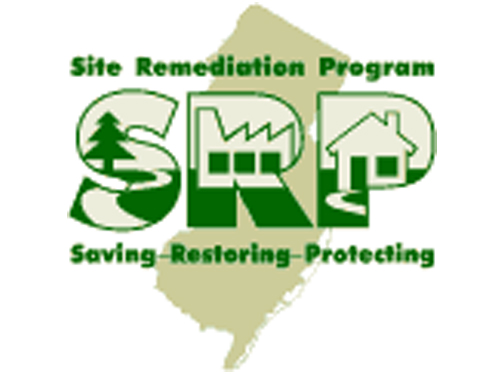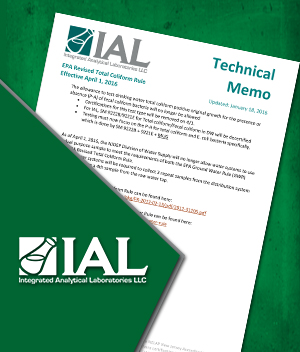NJ SRP Analytical Support

In 2014, the NJDEP Site Remediation Program (SRP) released the four-document Analytical Technical Guidance to help the environmental community comply with the established Technical Requirements for Site Remediation (Tech Rules, N.J.A.C. 7:26E). This collection of guidance documents was released on April 29, 2014, with a six-month phase-in period ending October 29, 2014:
- Analytical Laboratory Data Generation, Assessment and Usability Technical Guidance
- Quality Assurance Project Plan (QAPP) Technical Guidance
- Data of Known Quality Protocols (DKQP) Technical Guidance
- Data Quality Assessment (DQA) and Data Usability Evaluation (DUE) Technical Guidance
IAL has fully implemented the NJDEP Analytical Technical Guidance and has prepared a 22-page summary to help navigate these remediation-phase requirements. We have additional documents, also available upon request, to assist clients in understanding and applying the data generation, assessment and use process to their projects:
- Project Set-up Form, which informs IAL of your specific Data Quality Objectives (DQOs) for a specific project (see Appendix A1 of the DKQP Technical Guidance document referenced above)
- Compound Lists & Reporting Limits, which aid in the preparation of QAPPs and project DQOs
- Quality Control FAQ, which outlines key concepts and definitions relevant to the process and your sample
We welcome your questions on the new guidance and how IAL can work with you to meet the requirements. Issues and relevant aspects of the guidance may be discussed at your office location, or a webinar may be arranged.
NJ SRP Analytical Support Options
-
QAPP Input and DQOs
Assistance with QAPP Development and Data Quality Objectives (DQOs)
NJDEP's Analytical Technical Guidance reemphasizes the need for creating a Quality Assurance Project Plan (QAPP) for site sampling and analysis activities. The Quality Assurance Project Plan Technical Guidance, one of four documents comprising the Analytical Technical Guidance, states that the QAPP:
. . .integrates all technical and quality aspects of a project, including planning, implementation, and assessment. The purpose of the QAPP is to document the planning for environmental activities and to provide a project-specific 'blueprint' for obtaining the type and quality of environmental data needed for a specific decision or use./ . . .A total program to produce DKQ [Data of Known Quality] should include both a QA and QC component, which encompasses the management procedures and controls to assess the precision, accuracy, completeness, sensitivity, and representativeness of the site data set./ . . .A QAPP is a required part of a Remedial Investigation Workplan (RIW) and the Remedial Action Workplan (RAW)./ . . .It is recommended that the CSM [Conceptual Site Model], DQOs [Data Quality Objectives], and QAPP be applied at the earliest stages of sample collection and analysis to ensure that the appropriate methodologies are utilized. . .
Client development and communication of the QAPP with all involved parties, including the laboratory, is critical to obtaining data most likely to meet the project-specific Data Quality Objectives. To that end, IAL can assist by providing compound lists, reporting limits, method performance parameters, and more, for formulating the DQOs and for meeting QAPP document requirements.
Contact us to learn more, or to have us personally assist with your project needs!
-
Data of Known Quality (DKQ) Guidance
Understanding Data of Known Quality Protocols (DKQP)
IAL has fully implemented the NJDEP Analytical Technical Guidance, which includes the DKQP. As defined in the Data of Known Quality Protocols Technical Guidance document:
The DKQPs are analytical performance objectives that were developed to standardize the minimum Quality Assurance/Quality Control (QA/QC) and reporting documentation expected for the analytical laboratory data used by the investigators . . .The primary function of the DKQPs is to describe specific quality assurance and quality control procedures that will be performed by the laboratory to provide analytical data of known and documented quality. Other components of this guidance include a Data of Known Quality Conformance/Non-Conformance Summary form that the laboratory could use to indicate whether the data meets the guidelines for "Data of Known Quality," and a narrative that describes QA/QC non-conformances.
The DKQPs provide for consistency in the QA/QC criteria used and reported by laboratories to mitigate variability in the assessment and usability of data by investigators. This not only allows for greater uniformity in QA/QC procedures and reporting across laboratories, but also in the interpretation of these results across sites by investigators. Of course, the communication of a project's Data Quality Objectives to a laboratory during project planning activities (e.g., preparation of Quality Assurance Project Plans) is a critical component to optimizing the likelihood that the quality of the data will be suitable for the investigator's intended purpose.
To help navigate these remediation-phase requirements, we prepared a 22-page summary of the Analytical Technical Guidance that is available upon request. Issues and relevant aspects of the guidance may be discussed at your office location, or a webinar may be arranged.
Contact us to obtain a copy of the summary document, schedule a presentation, or discuss DKQP application to your project!
-
Data Assessment and Usability Support
Practical Considerations in Applying the Data Quality Assessment and Data Usability Evaluation Guidance
The NJDEP Data Quality Assessment and Data Usability Evaluation Technical Guidance is one of four documents comprising the NJDEP Analytical Technical Guidance. The document provides guidance on the two-step process in the review and use of analytical data produced during the remedial phase of a project; it defines the process as follows:
. . .The first step of the process is a data quality assessment (DQA) to identify and summarize any quality control problems that occurred during laboratory analysis (QC nonconformances). The results of the DQA are used to perform the second step, which is a data usability evaluation (DUE) to determine whether or not the quality of the analytical data is sufficient for the intended purpose./. . .The process of obtaining analytical data that are of sufficient quality for the intended purpose and evaluating the quality of analytical data in relation to project-specific DQOs occurs throughout the course of a project. It is the investigator's responsibility to perform the DQA/DUE process; therefore, the investigator's contact with the laboratory should be limited to explaining any issues that were not adequately addressed in the narrative (nonconformance summary) and, if provided, a Data of Known Quality Conformance/Nonconformance Summary Questionnaire (DKQP Guidance). It should be noted that the investigator, not the laboratory, is responsible for the usability of the data.
As a result, a number of clients have remarked that they now review a greater number of QA Nonconformance notes (qualifiers) than ever before. To assist in their review, IAL has prepared a qualifier reference guide for the user to help them efficiently review and determine data usability for their project.
Please contact us for personal assistance in applying the guidance to your project data.





